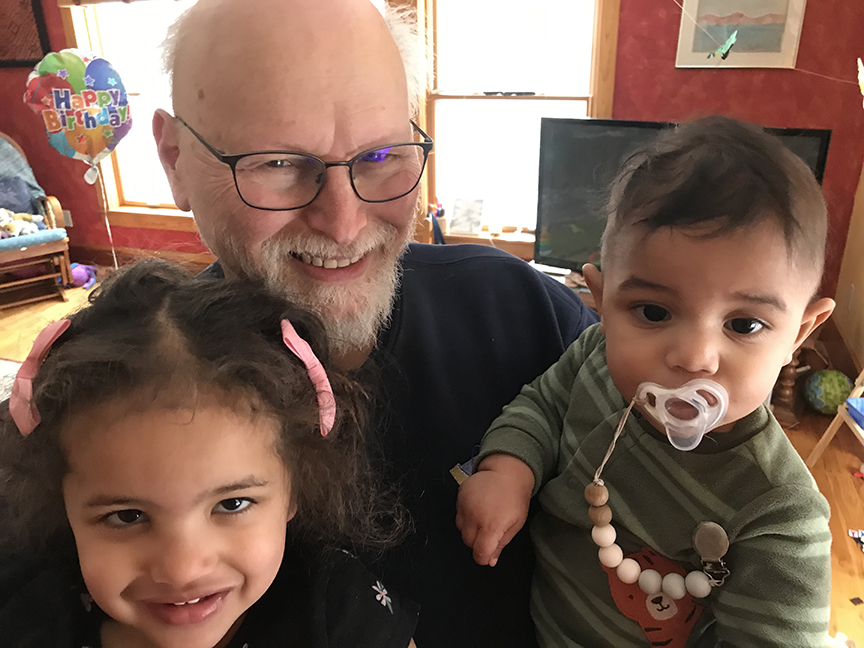David R. Mehr
The Many Voices of Peace Studies: Celebrating 50 Years
David R. Mehr
David Mehr, professor emeritus of Family and Community Medicine, has a passion for peace and has been active in the Peace Studies program and the Friends of Peace Studies since the mid-1990s, more than 30 years.
The professor emeritus has been involved in Peace Studies in numerous ways: He was chair of Friends of Peace Studies, has been a supporter/donor to Peace Studies, a guest lecturer for the program, and a member of the Peace Studies Faculty Advisory Committee at various times throughout his career.
“The program exists to communicate the important issues around war, peace, and social justice, which are all related together. You know the slogan: ‘No Justice, No Peace,’” Mehr says.
Mehr adds he’s had a close relationship with almost all the Peace Studies directors, going back to Michael Ugarte, and then John F. Galliher (1937-2019), and Clarence Lo …
Long History of Social Activism
“I’ve had a long history of social activism and interest in peace. One of my early interests was the Israeli-Palestinian conflict. I’ve long felt that there was an imbalance there – and that while I certainly sympathize with the founding of Israel, the Palestinians received very unfair treatment in the process.
“The other connection to peace, and the basis of why I created an endowment (The Helen Margulies Mehr Opportunities for Excellence in Peace Studies Endowment), is that peace was a real passion for my mother. She was a psychologist and got involved in peace activities back in the 1960s. She went on to become one of the founders of the Division of Peace Psychology of the American Psychological Association.
“So, it kind of runs in the family. And in terms of my own personal efforts, I participated in many anti-war demonstrations over many years. I’ve done a lot of activism in that area.”
Mehr says when John Galliher became director, Galliher’s long-standing passion in opposition of the death penalty, one of his major interests, really intrigued him.
“He put on a really interesting conference in the late 1990s or early 2000s where he brought in people who were from states that abolished the death penalty – people who were working to maintain that abolition, emphasizing the importance of small numbers of committed activists. That had a profound effect on me in terms of feeling the importance of supporting efforts against the death penalty.
“Many of my interests in support of Peace Studies fundamentally resolve around my social activist commitment. At the same time, I recognize the importance of what fits in as a part of the university. It needs to be an academic discipline. I’m an academic.
“I understand the importance of creating scholarship and providing a solid academic framework. But Peace Studies takes a broader perspective than many disciplines in terms of introducing concepts of conflict resolution and understanding the human condition.”
Peace Studies Origins
Mehr says the origins of Peace Studies grew out of activity around the anti-war movement of the 1960s and 1970s. In part, the Vietnam War. He says while he was not involved in the university at that time, he has seen it grow from his early years to move toward a more “solid foundation as an academic program” moving from one that taught a few undergraduate courses to one of solid academic framework. He says a time of particular growth was under former director Clarence Lo.
“Clarence had a lot of vision in terms of thinking about small grants for projects, and postdoctoral or graduate fellowships. He brought some real strength to the program and really advanced it. He jumped into online teaching early on when it was just beginning to become a thing. He created several online courses, which I think was a big success for the program.”
“I think (current director) Daive (Dunkley) has similar thoughts in terms of really enhancing the academic stature of the program.”
Mehr explains while the program may be growing, it has been and still is linked to the community through public events sponsored by Peace Studies. For example, in 2012, Andrew J. Bacevich, professor emeritus of international relations and history at Boston University, and a graduate of the U.S. Military Academy, came for a visit to address U.S. foreign policy for an annual lecture on peace perspective. Bacevich has authored more than a dozen books on war, militarism, foreign relations, etc.
“He has a military background, yet has been a real critic of recent military policy, and has written books about it,” Mehr says. “He’s interesting because he comes out of a sort of conservative place whereas most in the program commonly identify with people coming out of a more liberal place. But he still had a very strong critique of recent military policy as an instrument of national purpose: the wars in Iraq and Afghanistan, for example.
“I’d say these types of events are one of the distinguishing things about Peace Studies that other departments or schools have picked up over the years. I really appreciate many of the public events, the opportunities that the program has provided for us to interact with some of these outside speakers,” Mehr continues.
“We are strongly supported by Friends of Peace Studies, and they are a continuing source of contributions, initially for providing operation funds to the program. They provided the initial support and continue as a group of community people who support the program and are interested in the activities of the program.”
